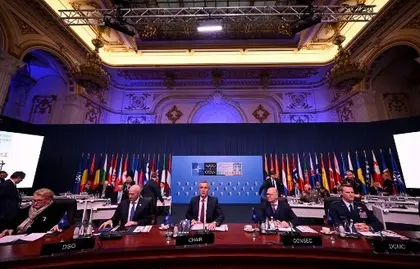The two-day NATO Foreign Ministers meeting that took place in Bucharest against the backdrop of Russian systematic bombardments of Ukraine’s critical infrastructure which have left hundreds of thousands without light and electricity, has come to an end — and the results are largely positive.
The main expectation had been that western allies would provide immediate relief to restore the damaged power grid and protect the cities from missiles attacks and the ministers met that expectation, pledging to restore the embattled country’s facilities and prevent Putin from “weaponizing the winter,” a term used several times by NATO’s Secretary General Jens Stoltenberg.
JOIN US ON TELEGRAM
Follow our coverage of the war on the @Kyivpost_official.
In particular, U.S. State Secretary Anthony Blinken announced the U.S. would provide transformers and generators worth $53 million within days or weeks. He also said the administration has requested additional aid from the U.S. Congress to help Ukraine restore critical infrastructure.
The ministers also promised to provide more air defense systems. Blinken, though, effectively avoided the question about the delivery of Patriot surface-to-air systems with the U.S. insisting that it provides the kind of weapons that Ukraine needs at a specific point in time.
Later, the U.S. committed eight NASAMS ground-to-air defense systems and associated munitions, two of which will be in Ukraine in the very near future.

Diane Francis Interviews Mikhail Zygar, Yaroslav Trofimov on Prospects of Russia’s War on Ukraine
Ukraine’s expedited membership bid
Touching upon Ukraine’s NATO membership bid filed in late September, Stoltenberg made several important statements, among them that the alliance is ready to discuss it once the war is over.
“If Ukraine does not prevail as an independent sovereign state, then, of course, the membership issue is not at the table at all,” he answered to a New York Times question about whether Ukraine earned NATO membership by defending the values of democracy and freedom.
The fact that Stoltenberg stressed multiple times that Ukraine must win the war
while the Russian authoritarian regime must fall is important because, until recently, in private conversations, not everyone believed that Ukraine is able to win the war. The change in rhetoric bodes well for Ukraine’s aspiration to become a NATO member state.
Losses: fictional vs. real
During the summit, President of the European Commission Ursula von der Leyen shocked journalists and experts alike when she said that since Feb. 24 Ukraine has lost 100,000 soldiers and over 20,000 civilians. According to Ukraine, Russia’s losses far exceed those of Ukraine.
Although von der Leyen later clarified that 100,000 includes all types of losses, it is unclear where this number came from and why it was publicized during the foreign ministers’ meeting.
Another issue that slightly marred the summit was Hungary’s continued blockage of Ukraine’s participation in the foreign ministers’ meetings, which it has done since 2017. Although occasionally Hungary makes positive statements with regard to Ukraine, the Hungarian government claims that Ukraine discriminates against the Hungarian minority living in Transcarpathia.
Consequently, during the summit, the European Parliament called upon the European Commission to investigate whether European Commissioner for Neighborhood and Enlargement Olivér Várhelyi, a Hungarian national, is biased in his actions. That the EU refused to allot 7.5 billion euros in aid to Hungary was extremely timely and demonstrated that Hungary’s blackmailing policy is no longer tolerated.
Could the meeting have been better?
All in all, Bucharest is not lucky for Ukraine. This is the very same city where in 2008 France and Germany blocked Kyiv from membership action during a NATO summit.
This time, even though the allies pledged support and made several important statements, it goes without saying that more could have been promised and less vague rhetoric could have been delivered.
Key speeches made by both Stoltenberg and Blinken were opaque in many areas, with Stoltenberg claiming the reason why he couldn’t quantify the help pledged to Ukraine being that “he had already left the meeting by then” — a rather strange excuse given that Ukraine is suffering immensely in this war and the Ukrainian journalists have made it clear they want answers beyond the something-being-discussed type.
Unfortunately, we are yet to start receiving them.
The views expressed are the author’s and not necessarily of Kyiv Post.
You can also highlight the text and press Ctrl + Enter






